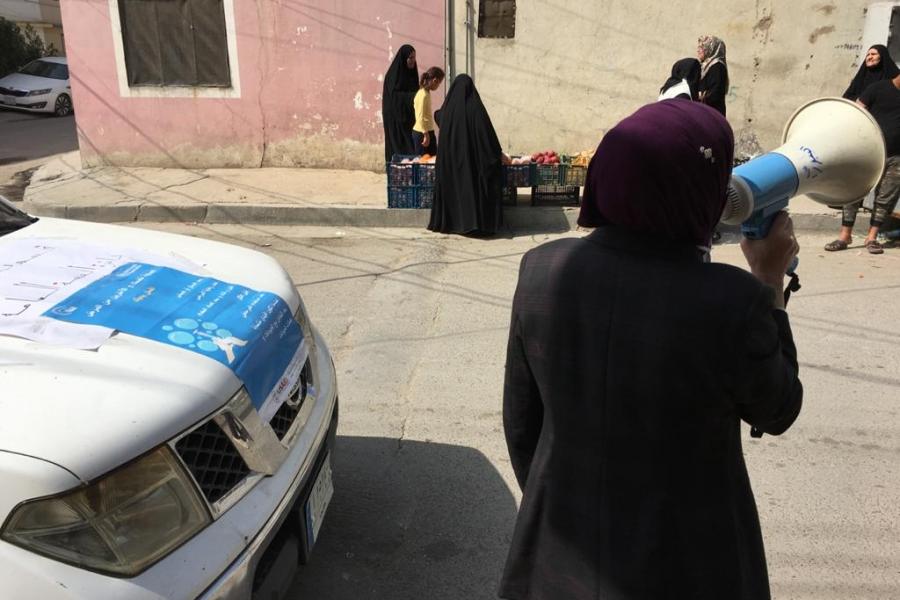WHO reiterates its close cooperation and coordination with Iraqi health authorities to ensure the efforts to combat COVID-19 are successful
28 May 2020
Baghdad: Since the beginning of the COVID-19 pandemic, The World Health Organization (WHO) focused on fighting the pandemic with every tool at disposal to save lives and support many world countries with limited COVID 19 response capacity, including Iraq.

WHO and the Iraqi health authorities have proactively coordinated a comprehensive response to the pandemic as early as January 2020. The Organization scaled up the country’s readiness and response operations mechanism as well as the pandemic preparedness plan of action.
Several important actions- on both the Central and Regional ministries of health- were taken in coordination with WHO before the reporting of the first case in the country on 24 February. These actions included enhancing coordination and planning amongst all stakeholders and partners at national and international levels; communicate with communities about the risks and how they can protect themselves; and find, isolate, test, trace every contact, and treat every case.
A joint technical team from WHO Regional Office and HQ arrived Iraq on 9 March to assess the capacity of the Iraqi Ministry of Health and health facilities on disease detection, identification, and case management. The team provided guidance to fill the gaps in the priority order and assisted in improving the health measures taken by the government. Designated hospitals were accordingly prepared to respond to a potential spike in cases with a focus on protecting and training health workers on a variety of associated topics like infection prevention and case management.
“The Government of Iraq, with the full support of WHO, mobilized resources at an early stage of the pandemic to contain its transmission. National, regional and local authorities implemented strong measures to reduce the number of cases and suppress the rapid spread of the virus. These early preventive actions contributed to extending and delaying the epidemiological curve, resulting in comparatively fewer documented cases compared to neighbouring countries,” said Dr. Adham R. Ismail, WHO Representative in Iraq.
WHO support to the national health authorities extended to include active surveillance, situation assessment and analysis, and awareness-raising sessions targeting first-line staff in border points and country airports.
Rapid response teams were also mobilized to carry out country-wide awareness and contact tracing and testing activities including the dissemination of hundreds of thousands of infection prevention and control messages and guidelines.
Case management and continuity of essential services in addition to logistics, procurement, and supply management, on the other hand, were among the priority areas WHO and ministries of health on both the Central and Regional level closely coordinated at an early stage of the response.
The Organization, furthermore, lead a series of activities encouraging the adherence to the lockdown and avoidance of any mass gatherings that could destabilize the numbers of cases and eventually lift the Epi Curve. In this endeavour, WHO Iraq visited the religious Supreme Seminary in Najaf and recommended to postpone the religious gatherings. “WHO commends the stance of the Supreme Seminary in support of WHO and MOH recommendations and thanks its positive response to encourage the Iraqi people to follow health preventive measures and recommendations,” added Dr. Ismail.
The provision of lab services was also promoted. Direct cooperation between WHO and the Covid-19 Crisis Cell of Basra University succeeded in April 2020 in producing urgently-needed laboratory supplies to speed up the testing of suspected cases. This significant achievement was later copied by other region countries.
On the 20th of May of this year, Heads of Government from around the world beamed into the World Health Assembly (WHA) to discuss lessons, challenges and collective next steps to tackle the pandemic. The Assembly productively concluded with a landmark resolution underlining WHO’s key role in promoting access to safe and effective health technologies to fight the pandemic.
“The resolution sets out a clear roadmap of the critical activities and actions that must be taken to sustain and accelerate the response at the national and international levels,” said WHO Director-General Dr. Tedros Adhanom. “The resolution assigns responsibilities for both the WHO and its member states and captures the comprehensive whole of government and whole of society approach we have been calling for since the beginning of the outbreak. If implemented, this would ensure a more coherent, coordinated, and fairer response that saves both lives and livelihoods.” The DG concluded.



